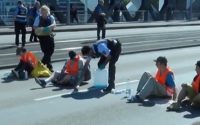North Korea has ignored US outreach about Travis King
North Korea has not replied to US attempts to discuss the fate of an American soldier who defected to the hermit kingdom by running across the border in a possible attempt to evade an assault trial, officials in Washington said.
“Yesterday, the Pentagon reached out to counterparts from the Korean People’s Army,” State Department spokesman Matthew Miller said Wednesday. “My understanding is that those communications have not yet been answered.”
National Security Council spokesperson John Kirby said Thursday that officials were not yet able to determine Army Private 2nd Class Travis King’s location and current condition.
“We’re still doing everything we can to try and find out his whereabouts as well [as his] condition and making it clear that we see him safely and quickly returned to the United States and to his family,” Kirby said.

Noting the country’s reputation for its harsh treatment of Americans and overall human rights violations, Kirby said officials were doing everything they could to try to get King, 23, back on US soil.
“This is a brutal regime and we all are aware of that, but we’re not in any position to confirm one way or another how he’s being treated,” Kirby said.
King was supposed to be headed to Fort Bliss, Texas, after finishing a prison sentence in South Korea for assault, but fled to North Korea while touring the Demilitarized Zone dividing the two countries.

He is the first known American held in North Korea in almost five years.
Without mentioning King, North Korea’s defense minister Kang Sun Nam spoke Thursday about a recent US submarine deployment in South Korea, calling it “the most undisguised and direct nuclear threat” to the North.
The deployment, which was part of a US plan to provide bolstered security to South Korea, took place on the same day that King fled across the border. Later that day, North Korea test-fired two missiles.

“The US military side should realize that its nuclear assets have entered extremely dangerous waters,” Kang cautioned.
What caused King to cross the border remains unclear, but the current tensions between the US and North Korea may complicate efforts to bring him back.
Pentaon rep Sabrina Singh said he wasn’t chaperoned to the plane because he was out of custody.
“He was leaving his deployment and had faced consequences in Korea, had served that time that he served in the correctional facility, and then was returning home … He was facing additional administrative action [not criminal], but I’d leave that to the Army to speak to what exactly that was,” Singh said.
US officials say King made a “deliberate decision” to cross into North Korea, but they have not elaborated on how he eluded officials en route to the airport and made it to the Demilitarized Zone.

King is believed to be in custody in North Korea, the UN Command tweeted.
“We believe he is currently in DPRK custody and are working with our KPA counterparts to resolve this incident,” the message continued, referring to North Korea’s Korean People’s Army.
The US and North Korea do not have formal diplomatic relations, but Sweden has stepped in to help Washington, DC, on matters in the Hermit Kingdom since 1995.

The US could reach North Korea through a hotline at the US-led UN Command in Panmunjom — known as the “pink phone.”
The US State Department has reached out to officials in both South Korea and Sweden.
Swedish officials, however, are not able to negotiate detained Americans’ releases.

Jeon Ha-kyu, a spokesperson of South Korea’s Defense Ministry, said Thursday his ministry is sharing information with the American-led UN Command in South Korea but did not share any further details.
With Post wires


